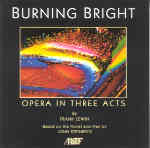The first question raised upon hearing this release of Frank Lewin’s full-length opera: what on earth happened during the mixing process? The voices are so far forward and recorded in such an unflattering fashion, and the orchestra sounds so consistently out of balance and fuzzy that it could not possibly have been an oversight or an accident. It is difficult even to discuss the piece because no voice, no matter how excellent, sounds good when recorded with this sort of flagrant disregard for decent sonics.
At its core, the premise of Burning Bright appears to be the stuff of interesting opera. Based on a play and novel by John Steinbeck (always nice to see an American composer setting an American story), the plot is fairly simple: man and younger wife cannot have a child; she seduces macho upstart with the intention of getting pregnant, in order that the family line may continue; things begin to fall apart when upstart falls in love with wife; husband finds out about the deception and, after an episode of rage, accepts the child as his own.
The “gimmick” here lies in the fact that the characters and the location are not exactly the same from act to act, even though the plot is consistent–the characters move from being circus performers, farmers, and sailors, to actually traveling in outer space. A comment on how things stay the same no matter what the setting, this is a blatant outline of a universal truth. But this setting, clocking in at more than three hours, outstays its welcome in a big way.
The music sounds like one long painfully slow recitative in multiple styles, mostly tonal, that occasionally swells into an aria-like passage or a frantic dance. There are wild, angry moments, during which Lewin does his best work. Aside from the opera’s overall plod and dreariness, with its matter-of-fact text-setting that always misses the prosodic mark, some of Lewin’s musical choices are simply off the wall and border on unforgivable. For example, his use of the electric guitar is anachronistic and just plain overdone (it accompanies every Act 1 line sung by Victor, the macho youngblood–we get it, we get it!).
Lewin’s sense of the orchestra seems clunky and unrefined, though again this could be the recording more than the piece. But there are several long stretches that ought to have been trimmed or just plain left out. Take for example an endless scene at the beginning where the lead character idly hums along with an offstage circus band while eating dinner (complete with the sounds of dishes and chewing). There also are long dialogue passages over a solo fiddle at a festive square dance, the hammed up presentation of which might cause you to aim for your “skip” button. Lewin also chooses to have some wild circus music (local color, undoubtedly) present in almost all of Act 1, hammering you over the head start-to-intermission. This opera desperately needs an editor.
The nice moments that occasionally do occur in this mess are far too infrequent, and more often than not are disfigured beyond repair by the unlistenable sound quality. This begs one final question to all concerned: if proper care isn’t put into the release of a long, complicated new piece, why record it at all?
































